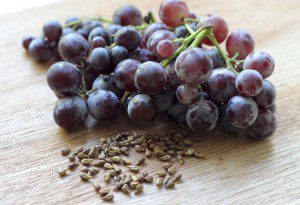By Sayer Ji
Contributing Writer for Wake Up World
A study published in the Journal of Cell Communication and Signaling compared the effects of a grape seed extract (GSP) to the diabetes drug metformin (MET) in rats fed a high fat, high fructose diet (HFFD) designed to provoke insulin resistance.
In the study titled “Grape seed proanthocyanidins and metformin act by different mechanisms to promote insulin signaling in rats fed high calorie diet”, Indian researchers discovered that both substances reduced elevated blood glucose (hyperglycemia) and elevated blood insulin (hyperinsulinemia), while improving the following diet-altered parameters: glycolysis, tyrosine phosphorylation of IR-β and IRS-1, IRS-1-PI3K association and Akt activation.[1]
Furthermore, adverse changes induced in the rats by the HFFD, such as the activation of tumor necrosis factor-α, interleukin-6, leptin and suppression of cytokine signaling-3 and reduction in adiponectin, were reversed by Grape Seed Proanthocyanidins more effectively than by Metformin.
Proanthocyanidins are a type of secondary plant metabolites known as flavonoids found in many plants, but are particularly concentrated in cocoa beans, cinnamon, grape seeds and skin, and maritime pine bark (pycnogenol). Proanthrocyanidins are known primarily through their antioxidant properties, but a GreenMedInfo.com research project has identified at least 20 beneficial physiological actions to this phytochemical class relevant to at least 50 disease states.[2]
Metformin, on the other hand, is an oral antidiabetic drug in the biguanide class, and is used as the first-line drug for the treatment of type 2 diabetes. The original inspiration for the biguanide class was the discovery, in the 1920s, of guanidine compounds within the herb French lilac (Galega officinalis), long used to treat diabetes in traditional medicine. Metformin, however, is an entirely synthetic compound, whose exact mechanisms of action are unknown. What is known is that like other antidiabetic drugs (e.g. Avandia) metformin is cardiotoxic and has been linked to increased cardiac mortality in a number of studies.[3] Proanthrocyanidins, and grape seed extract in particular, have been extensively researched to have protective and therapeutic properties on the cardiovascular system.[4]
Clearly, the weight of evidence suggests that grape seed proanthrocyanins hold great promise as a metformin alternative and/or anti-diabetic agent. Unfortunately, the law forbids the medicinal use of natural substances, and lacking the $800 million plus required on average to fund the clinical trials necessary to file for FDA drug approval, health consumers are left almost entirely without guidance from conventional medical practitioners who lose their FDA-underwritten liability shield when they deviate from the drug-based standard of care.
Of course, the deeper level of self-care focuses on identifying the environmental, dietary and lifestyle-based causes of blood sugar and insulin disorders, and altering them so that a magical “pharmaceutical” or “nutraceutical” bullet isn’t necessary. For more research on the many problem substances, natural substances, therapeutic actions and lifestyle interventions that may prevent and/or reverse blood sugar disorders, visit GreenMedInfo’s health guide on the topic: Health Guide: Blood Sugar Problems.
Resources:
[1] Baskaran Yogalakshmi, Saravanan Bhuvaneswari, S Sreeja, Carani Venkatraman Anuradha. Grape seed proanthocyanidins and metformin act by different mechanisms to promote insulin signaling in rats fed high calorie diet. J Cell Commun Signal. 2013 Sep 12. Epub 2013 Sep 12. PMID: 24026800
[2] GreenMedInfo.com: Research > Keywords > Proanthrocyanidins
[3] GreenMedInfo.com: Research > Problem Substances > Metformin
[4] GreenMedInfo.com: Research > Substances > Grape Seed Extract
Further articles by Sayer Ji:
- Eating Sesame Seeds Superior To Tylenol for Knee Arthritis
- The Grain That Damages The Human Brain
- Honey Plus Coffee Beats Steroid For Treating Cough
- The Cancer-Causing Metal Millions Eat, Wear or Have Injected Into Their Kids
- Turmeric Superior to Chemical Mouthwash In Improving Oral Health
- Biophotons: The Human Body Emits, Communicates with, and is Made from Light
-
The 2013 Measles Outbreak: A Failing Vaccine, Not A Failure To Vaccinate
- 3 Evidence-Based Ways To Reverse Skin Aging Naturally
-
Why Is The Food Industry Poisoning Us With Trillions of Nanoparticles?
- How to Clean Your Arteries With One Simple Fruit
- 13 Evidence-Based Medicinal Properties of Coconut Oil
About the author:
 Sayer Ji is the founder and director of www.GreenMedInfo.com and an advisory board member at the National Health Federation, an international non-profit, consumer education, health-freedom organization.
Sayer Ji is the founder and director of www.GreenMedInfo.com and an advisory board member at the National Health Federation, an international non-profit, consumer education, health-freedom organization.
He co-authored the book Cancer Killers: The Cause Is The Cure, and is currently co-authoring another book with Tania Melkonian entitled EATomology: An Edible Philosophy of Food.
Check out Sayer Ji’s new collaborative project EATomology.com.

If you've ever found value in our articles, we'd greatly appreciate your support by purchasing Mindful Meditation Techniques for Kids - A Practical Guide for Adults to Empower Kids with the Gift of Inner Peace and Resilience for Life.
In the spirit of mindfulness, we encourage you to choose the paperback version. Delve into its pages away from screen glare and notifications, allowing yourself to fully immerse in the transformative practices within. The physical book enriches the learning process and serves as a tangible commitment to mindfulness, easily shared among family and friends.
Over the past few years, Wake Up World has faced significant online censorship, impacting our financial ability to stay online. Instead of soliciting donations, we're exploring win-win solutions with our readers to remain financially viable. Moving into book publishing, we hope to secure ongoing funds to continue our mission. With over 8,500 articles published in the past 13 years, we are committed to keeping our content free and accessible to everyone, without resorting to a paywall.







